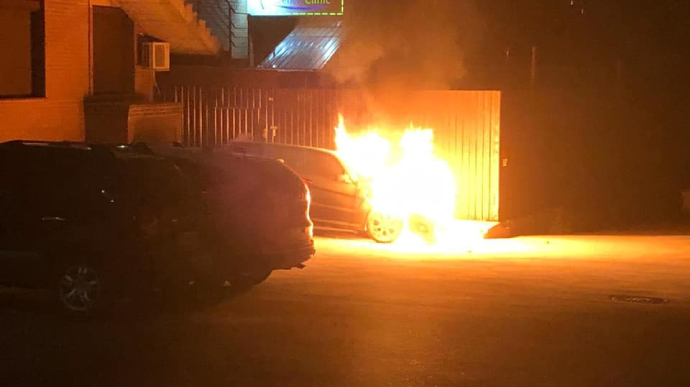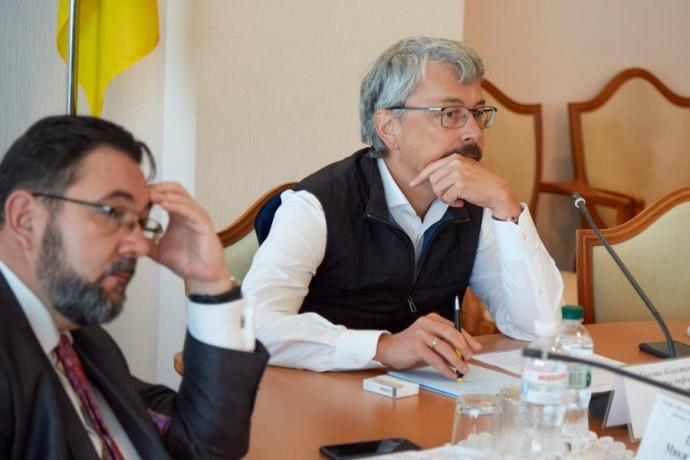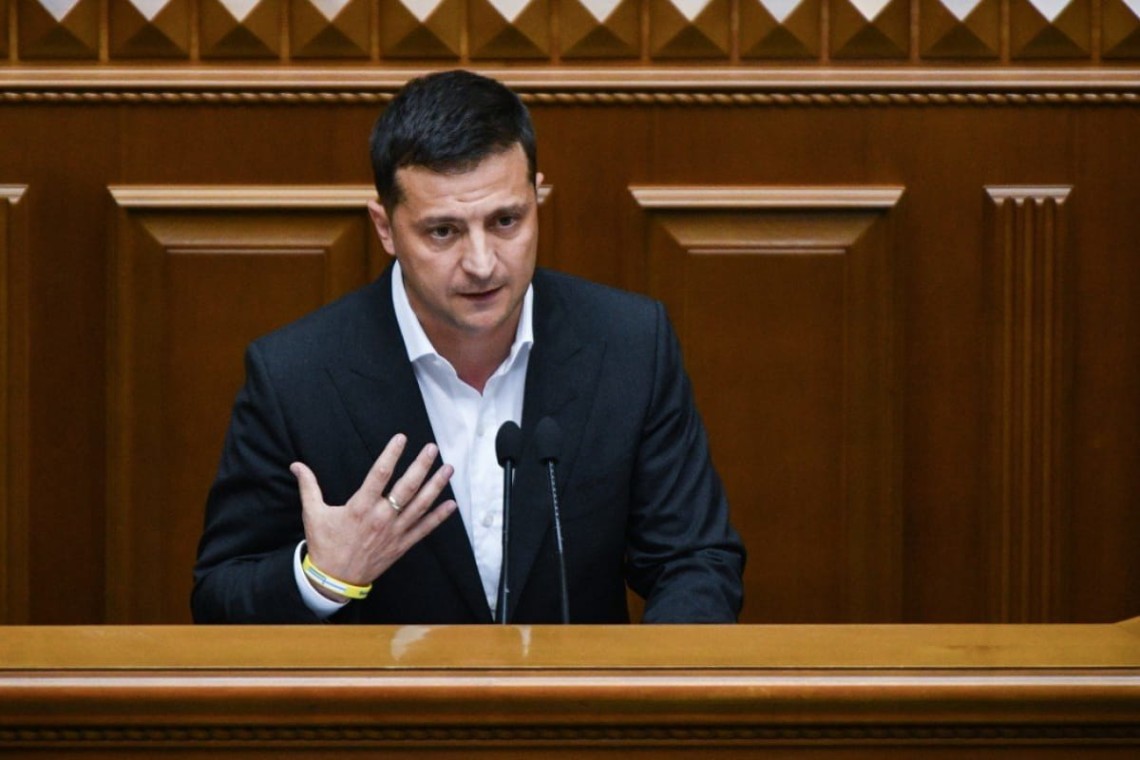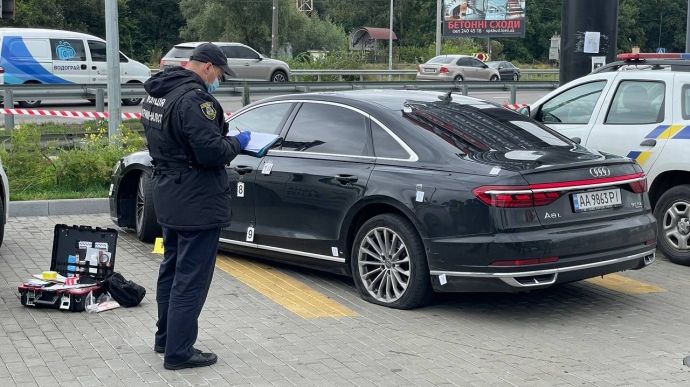His strong single-party parliamentary majority no longer votes unanimously. Instead, several divisions have formed within the party.
The story of whistleblower Geo Leros opens a new chapter in the saga of diminishing support for the Leader of the Land. Leros, a former member of President Zelenskyy’s Servant of the People party, was slammed with five criminal proceedings for publishing videos that prove the corruption of the head of Zelenskyy’s office, Denys Yermak.
In a clear act of arson, Leros’s car was burned down on 28 August 2020. Then four days later, after he publicly criticized Zelenskyy from the floor of Parliament, the Servant of the People party moved to expel Leros from their ranks.
However, his MP mandate will not be terminated, as warranted by law. At the same time, such a harsh measure exacted for a speech by a parliamentarian only weakens Zelenskyy -- the single Ukrainian president who has reacted to criticism as a vexed teenager would.
Expelling Leros demonstrates nothing less than failing authority within the party, as the president desperately tries to hide internal opposition through his lame "tough" measures.
The expulsion of Geo Leros
An urban art project director and former Zelenskyy advisor, turned-MP, Leros became a well-known public figure on 29 March, when he published videos alleging the brother of the head of the President’s Office, Denys Yermak, was trading top public offices for personal payoffs.

The State Bureau of Investigations (DBR) responded with unprecedented speed — they opened criminal proceedings against whistleblower Leros the morning after the postings. DBR is effectively controlled by President Zelenskyy, as was ratified by amendments to the law early in the president’s term, December 2019.
At the same time, the Specialized Anti-Corruption Prosecutor’s Office (SAP) has started criminal proceedings against brothers Andriy and Denys Yermak, for the potential abuse of power and corruption. In particular, the investigation reportedly uncovered a corruption scheme behind the tugboat monopoly in the country's two largest ports. The investigation was subsequently halted through Yermak’s directive.
The authenticity of published videos and rumors about Yermak’s influence on investigations are yet to be verified independently. Notwithstanding, the sharp reaction of Zelenskyy and his office does not add any credibility to their denials.

On 29 August, arsonists set fire to Leros’s car. This was the third case of arson in a month, preceded by the 23 June incineration of the house belonging to the head of the Anti-Corruption Action Center (a civil society organization that unites experts from legal, media, and civic-political sectors); and the 17 August burning of the car of journalist-investigators from the Skhemy project (a joint investigative project by Radio Free Europe/Radio Liberty’s Ukrainian Service and Ukrainian Public Television, UA: Pershy).
They had all criticized top Ukrainian politicians, including Zelenskyy and members of his team.
- Read also: Ukrainian NGOs demand proper investigation into devastating fire of anti-corruption fighter’s house
On 1 September, Leros delivered his powerful speech in Parliament for which he was expelled. In referring to the car arson, he stated that he “accepts the challenge”:
“It is obvious to me that the country is moving into an abyss … Instead of the promised ‘lifting of immunity from the President, deputies and judges,’ only opposition deputies were made vulnerable ... Promises of no ‘telephone law’ turned out not to apply to the management of the President's Office, which uses cover numbers for their private cars, and [head of the Presidential Office] Yermak himself gives instructions by phone against whom to open cases and which to close … Zelensky declared: ‘The surrender of national interests cannot be the subject of any negotiations.’ Today, it sounds like jeering, when the President's Office is headed by Mr. Yermak, an agent of the GRU of the Russian Federation [intelligence agency], who, through [negotiators in the Minsk Trilateral contact group] Kravchuk and Fokin is testing the planned betrayal … Let's move on to ‘zero tolerance for corruption’ and the fact that ‘the whistleblowers of corruption will be protected.’ In this country, only Zelenskyy was tolerant of the fact that the head of the President's Office is the main corrupt official in the country. I have only one question for you, Mr. President: are you not ashamed?!”
Although Leros did not provide any direct new proof for his accusations, he certainly has a foot to stand on.
Along with earlier-published damning videos, he referred to suspicious items regarding well-known public figures. These included pro-Russian statements by Donbas negotiators (appointed by Zelenskyy’s office), and the fact that Andriy Yermak and his father were business partners of Russian banker Rakhamim Emmanuilov.
- Read also: Fears of a pro-Russian turn as Yermak appointed new head of Ukrainian President’s Office
- Ukraine’s new Donbas negotiators wreak havoc with pro-Russian statements
- Wagner in Belarus: Ukrainian journalists cry treason as high officials suspected of blowing MID special op
Instead of openly and transparently debunking accusations, Zelenskyy chose to suppress Leros. An underhanded penalty was to open yet another criminal proceeding against Leros, this time for supposed tax evasion, even though Leros does not own any business enterprise and is not a taxpayer (Ukrainian laws require companies to pay taxes for their employees).
But the most damaging measure was when David Arakhamiya, head of the Servant of the People parliamentary faction (personally connected to Zelenskyy) started a petition for MPs to expel Leros from the party. Within a day it was done. According to another party MP, Danylo Hetmantsev, some 75% of party MPs signed the proposal to expel Leros — the rest refused to do so.
Zelenskyy had a curt comment, labeling Leros a "bribe-taker and traitor of the state”:
"I have no reaction to the bribe-takers and traitors of this country, and I don't care what party they are from. I have answered enough."
Servant of the People party receding rapidly and even authoritarian measures do not stem the backflow
The reprisal against Leros is mostly symbolic and will likely serve to undermine Zelenskyy’s power.
Roughly speaking:
- about 150 MPs remain loyal to Zelenskyy;
- about 90 have formed several oligarch-loyalist groups and are lobbying for their interests;
- about 60 have gone into silent resistance to Zelenskyy.
The latter rarely criticize him publicly but support few of his proposals, and from time to time even sign objections initiated by the official opposition.
Depending on the issue, many MPs join in with differently positioned groups at the same time.
Growing fragmentation
Analyzing the first-year performance by the Servant of the People party, a growing trend towards fragmentation is apparent.
At the time of its foundation, Ukrainian political analyst Valeriy Pekar surmised that the party would disintegrate quickly, the main reason being the motley composition of its members.
Ideologically, it was made up of both liberal and socialist MPs who, in turn, were both Ukrainian- and Russian-speaking. It was a mish-mash, where many newly elected MPs had little or no understanding of politics. Some were completely ignorant on important issues like the economy and had no experience in governance. Others were plainly lobbying for the interests of certain business groups.
At first, this huge majority party claimed to be working in so-called “turbo-mode,” supporting all presidential bills with almost no individual consideration, even when they skirted parliamentary regulation.
This practice soon generated the first conflict.
In late September a segment of MPs refused to abide by the demands of Zelenskyy’s office in the absence of caucus discussion. Later, this segment formed the so-called group of Dmytro Razumkov, head of Parliament.
Since then, other small groups have clustered around close friends of oligarchs. Most apparent is Ihor Kolomoiskyi’s group, informally led by the notorious MP Oleksandr Dubinskyi.
The talks took place a few short weeks after the appointment of the new head of the President's Office, Andriy Yermak. During the talks, Yermak lobbied for the creation of a Consultation Council that would, in effect, provide greater legitimacy to the Russian proxy republics in Donbas.
The statement revealed those party MPs who were now part of the silent resistance to Zelenskyy’s policies — often voting together with opposition parties Holos and European Solidarity. Leros was among the first MPs to sign the statement of appeal.
Half-a-year later, most of the intra-faction groups refused to support his expulsion from the party.

Supporting the action plan does not only signify a memorandum of understanding, it grants the government a year of immunity and ensures that it cannot be dissolved. The fact that MPs did not throw their support behind the action plan for Zelenskyy’s second government clearly demonstrates their lack of faith.
This significant development occurred on 18 June 2020 when Zelenskyy himself attended the session of Parliament and personally asked MPs to support his action plan. During his previous visits, Servant of the People MPs had unwaveringly supported his proposed bills.
But this time, only 176 party MPs voted in support of his plan.

A similar situation occurred with Serhiy Shkarlet, a crony of runaway president Yanukovych. The prime minister of the day, Denys Shmyhal, proposed Shkarlet for Minister of Education and Zelenskyy added his support.
However, after mass public demonstrations and numerous appeals to Parliament, MPs bowed to public protest rather than the president's will.
After that, MPs loyal to Zelenskyy retaliated by collecting signatures to dismiss Serhiy Babak, their fellow party member. Babak headed the parliamentary education committee but had refused to support the appointment of Shkarlet. The move outraged many MPs:
"This is not some random person. Babak was already in Zelenskyy's team when there was no team yet. He worked with everything from October 2018, did what he could. And now ... [they] will expel him? One can not do so with team members. We will not hand over Serhiy," commented an MP of the Servant of the People party.
Despite presidential majority, support of MPs for government bills falls twofold
Overall, voting data shows that the current assembly of Parliament has proposed and submitted fewer laws than the previous assembly during the same period last year.
Support of the president’s proposed bills has dropped by 30% (from 81% to 51%), while support for the government’s proposed bills has dropped more than twofold (from 37% to 17%).
The support of MP-proposed bills has slightly increased.
Such a dramatic decrease in parliamentary support of the president and his government is self-evident and diverges from the official narrative of Zelenskyy’s loyal MPs.
However, it should be noted that one of the reasons for high presidential support of Poroshenko in 2014 may be explained by the Russian aggression in Donbas and the need for a united stance by all branches of power; as well as by the fact that he submitted few law proposals in general (leaving little to oppose).

The data on dissent in the Servant of the People party – MPs who have voted contrary to their party position – also demonstrates that only half of party members are the monolith some might imagine.
Generally, almost half the party’s MPs vote according to the party position in 90% of cases - more often when compared to the dynamics in other parties. This half is passively fulfilling instructions that party leadership sends them in Telegram chats.
However, the other half of party MPs quite often (from 20% to 70% of cases) votes differently, belonging to various political sections that have various political interests.





